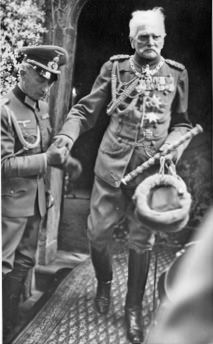
On this day in 1915,General August von Mackensen led a combined Austro-German force in defeating the Russian army near the Dunajec River (a tributary of the Vistula which runs through what is now Slovakia and Poland) and decisively ended nine months of victorious Russian advances in the region since August 1914. It was a key turning point in the war.
After Romania declared war on Austro-Hungary on 15 August 1916, Mackensen conquered Romania and on December 6 1915 Bucharest fell to him. Norman Stone said that by entering the First World War on the Allied side Romania delayed Allied victory by a year.
At the end of the war Mackensen complained when he left Bucharest that

"I came to Bucharest two years ago with a legion of conquering heroes. I leave with a troupe of gigolos and racketeers.”In his old age, Mackensen objected to the Night of the Long Knives of July 1934 and to the war crimes committed by German soldiers in Poland in 1939. Hitler and Goebbels doubted his loyalty but considered him untouchable. Mackensen remained a committed monarchist and attended the Kaiser's funeral in Doorn in 1941 in full uniform, aged 90.

Mackensen was briefly captured by the British Second Army at his home during the closing weeks of the Second World War. He died on 8 November 1945 at the age of 95, having served as a soldier first of Prussia and then throughout the catastrophic history of both the second and third German Reichs. As a Field Marshal from 1915 he remained theoretically always on the active list.
Why was there a skull on his helmet? The explanation is given in this clip at 4 minutes in.
Why was there a skull on his helmet? The explanation is given in this clip at 4 minutes in.
No comments:
Post a Comment